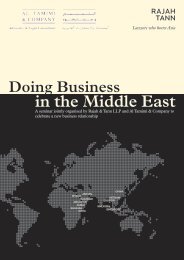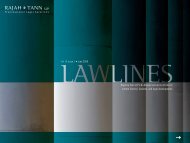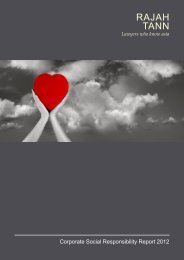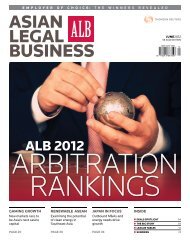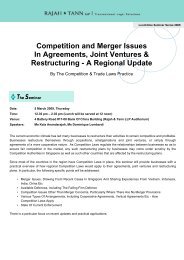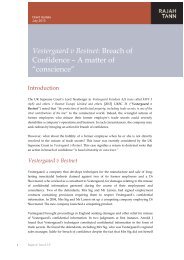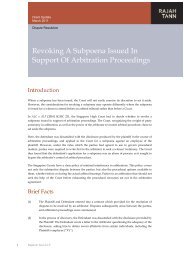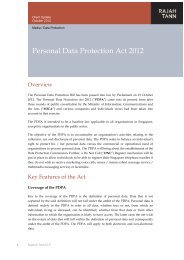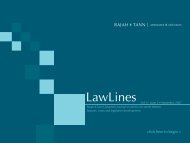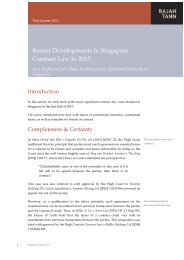Lawlines Volume 9 Issue 4 - eOASIS
Lawlines Volume 9 Issue 4 - eOASIS
Lawlines Volume 9 Issue 4 - eOASIS
You also want an ePaper? Increase the reach of your titles
YUMPU automatically turns print PDFs into web optimized ePapers that Google loves.
LawLinesVol 9 . <strong>Issue</strong> 4 • December 2007Around Rajah & TannRound Up – 2007 InPerspectiveFeature ArticlesTo Withhold Or Not ToWithhold – That Is TheQuestionAll Abuzz About GamesCorporate SocialResponsibility UnderThe New IndonesianCompany LawCase BitesLegislation BitesThe evidence was that A and B dictated companypolicy and instructed the directors of the threecompanies, who were accustomed to act uponsuch instructions. The English High Court found itparticularly signifi cant that two of the companiesadopted a policy that would result in the two payingtheir recoveries into a central treasury and furtherthat moneys would be paid out of the treasury tocompanies outside the group, in which A had asubstantial interest. Although the directors of thecompanies protested that control over paymentof creditors had been taken out of their hands,their protests were overridden by A and B and thedirectors complied with the instructions of A andB. Accordingly, they were found to be shadowdirectors of the companies.Dispute ResolutionNo Statutory Jurisdiction To Grant Stay OfCourt ProceedingsIn Albon v Naza Motor Trading Sdn Bhd (No 3)(2007) the English High Court held that it had nostatutory duty under Section 9 of the Arbitration Act1996 (the equivalent of Section 6 of the SingaporeArbitration Act) to grant the defendant company’sapplication for stay of court proceedings. Itexplained that the language of section 9 establishedtwo threshold requirements. The fi rst was that therehad been concluded an arbitration agreement, andthe second was that the issue in the proceedingswas a matter which under the arbitration agreementwas to be referred to arbitration. In the case at handthere was an unresolved issue of fact as to whetherthe arbitration agreement had been concluded dueto the alleged forgery of the subject agreement.Accordingly, there was as yet no jurisdiction underSection 9 to grant a stay. The Court then statedthat the absence of jurisdiction under Section 9 toorder a stay did not preclude the existence andexercise by the court of its inherent jurisdiction togrant a stay. The Court, however, was of the viewthat this case was not one of those exceptionalcircumstances where the exercise of its inherentjurisdiction was called for.Arbitration Award Not Procured By FraudThe English High Court in Elektrim SA v VivendiUniversal SA (2007) was confronted with the issueof whether an arbitration award was obtained byfraud due to the alleged concealment by the otherparty of a relevant memorandum at the arbitrationpage 31 of 44 pages | print | comments | close



